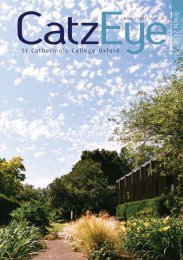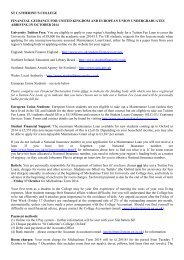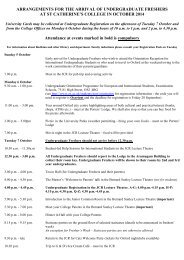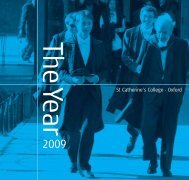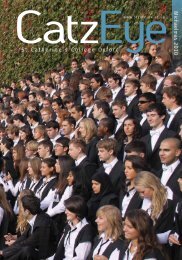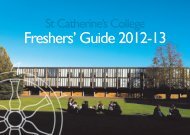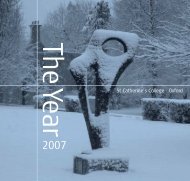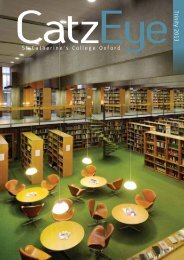Download PDF - St. Catherine's College - University of Oxford
Download PDF - St. Catherine's College - University of Oxford
Download PDF - St. Catherine's College - University of Oxford
Create successful ePaper yourself
Turn your PDF publications into a flip-book with our unique Google optimized e-Paper software.
COLLEGE LIFE<br />
Photograph by Guy Bell (www.gbphotos.com)<br />
participate as the characters. While there, he<br />
spent time with another group <strong>of</strong> scientists<br />
who gave him a pair <strong>of</strong> shoes that would alter<br />
the lighting level on the stage as he walked<br />
across it, and they showed him how they<br />
could project a ‘virtual goldfish’ into his hands<br />
and pass it from person to person.<br />
Whilst impressed, the shoes were ultimately<br />
‘ok’, the virtual goldfish was simply weird, and<br />
the video game remains in production. But, as<br />
for many <strong>of</strong> us, technology was an obsession<br />
and it was the focus <strong>of</strong> discussion for much <strong>of</strong><br />
the lecture, whether through David Hockney’s<br />
iPad drawings that were recently exhibited<br />
at the Royal Academy <strong>of</strong> Arts, the acoustics<br />
<strong>of</strong> the Greek amphitheatre that allowed a<br />
chorus to play to thousands <strong>of</strong> people, or<br />
the technological ingenuity <strong>of</strong> theatre groups<br />
such as Filter, Complicité and Cirque du Soleil.<br />
Yet throughout his use <strong>of</strong> these examples, he<br />
insisted, ‘it’s not about the technology.’ He<br />
was enthralled by the vibrant colour schemes<br />
<strong>of</strong> Hockney’s drawings, not their electronic<br />
canvas, and likewise in the theatre he held<br />
that technology exists only to enhance or<br />
subtly augment what is physically present on<br />
the stage.<br />
Sir Michael suggested that theatre currently<br />
enjoys something <strong>of</strong> a ‘golden age’, that<br />
it’s cool again. A new generation <strong>of</strong> daring<br />
young playwrights are now dominating the<br />
scene, international theatres like the Barbican<br />
allow us to learn from the artistic approaches<br />
<strong>of</strong> other cultures, and 2012 saw the global<br />
success <strong>of</strong> Danny Boyle’s Olympics opening<br />
ceremony. Last year was a record breaking<br />
one for theatres across London as box <strong>of</strong>fice<br />
sales eclipsed £14 million. But this would not<br />
last, he warned, and gadgetry will feel even<br />
more expensive in a recession. So what will<br />
become <strong>of</strong> theatre as the economic situation<br />
worsens?<br />
The audience were asked to consider a range<br />
<strong>of</strong> possibilities and directions in which theatre<br />
could go. Will we gather our audiences<br />
through social media? Will genres be ‘pushed<br />
together to cuddle each other from the<br />
cold’? Will the audience’s interaction with the<br />
theatre’s physical space become so significant<br />
as to render the actor secondary? Will it overdepend<br />
on celebrity, and become ‘frankly<br />
too embarrassing to watch’? Will it be faster,<br />
borrowing on the speed <strong>of</strong> rap and urban<br />
artists such as Jay Z and Debbie Tucker Green?<br />
Or will it be slower? Will the theatre be a<br />
place for measured reflection, a church; as Jez<br />
Butterworth says, ‘a place in which we evoke<br />
anxieties and deal with them together’?<br />
This lecture <strong>of</strong>fered no definitive answers, but<br />
did invite a number <strong>of</strong> questions that took<br />
us deep into a discussion focussed not only<br />
on what theatre might become, but <strong>of</strong> what<br />
it is to us now. Before taking questions from<br />
an audience that was positively bursting to<br />
engage, Sir Michael marked the beginning <strong>of</strong><br />
his Pr<strong>of</strong>essorial tenure with an invitation to<br />
the <strong>University</strong> <strong>of</strong> <strong>Oxford</strong> ‘to become a major<br />
international arts institution’. I’m sure that the<br />
students in the audience have been invigorated<br />
by this rallying call and cannot wait to fully<br />
welcome Sir Michael when he begins his work<br />
with them over the coming year. n<br />
Joe Murphy (2009, English) graduated from<br />
Catz last Trinity Term and has taken up his<br />
post as this year’s <strong>University</strong> Drama Officer, a<br />
position created by the Cameron Mackintosh<br />
Drama Fund.<br />
ST CATHERINE’S COLLEGE 2012/7



